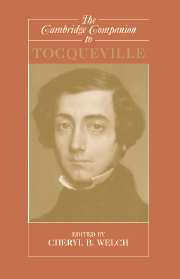Book contents
- Frontmatter
- Introduction: Tocqueville in the Twenty-First Century
- 1 Tocqueville’s Comparative Perspectives
- 2 Tocqueville on 1789: Preconditions, Precipitants, and Triggers
- 3 Tocqueville’s New Political Science
- 4 Tocqueville, Political Philosopher
- 5 Tocqueville’s Democracy in America Reconsidered
- 6 Translating Tocqueville: The Constraints of Classicism
- 7 The Writer Engagé: Tocqueville and Political Rhetoric
- 8 The Shifting Puzzles of Tocqueville’s The Old Regime and the Revolution
- 9 Tocqueville and Civil Society
- 10 Tocqueville on Threats to Liberty in Democracies
- 11 Tocqueville on Democratic Religious Experience
- 12 Tocqueville on Fraternity and Fratricide
- 13 Tocqueville and the French
- 14 Tocqueville and the Americans: Democracy in America as Read in Nineteenth-Century America
- Bibliography
- Index
- Series List
7 - The Writer Engagé: Tocqueville and Political Rhetoric
Published online by Cambridge University Press: 28 January 2007
- Frontmatter
- Introduction: Tocqueville in the Twenty-First Century
- 1 Tocqueville’s Comparative Perspectives
- 2 Tocqueville on 1789: Preconditions, Precipitants, and Triggers
- 3 Tocqueville’s New Political Science
- 4 Tocqueville, Political Philosopher
- 5 Tocqueville’s Democracy in America Reconsidered
- 6 Translating Tocqueville: The Constraints of Classicism
- 7 The Writer Engagé: Tocqueville and Political Rhetoric
- 8 The Shifting Puzzles of Tocqueville’s The Old Regime and the Revolution
- 9 Tocqueville and Civil Society
- 10 Tocqueville on Threats to Liberty in Democracies
- 11 Tocqueville on Democratic Religious Experience
- 12 Tocqueville on Fraternity and Fratricide
- 13 Tocqueville and the French
- 14 Tocqueville and the Americans: Democracy in America as Read in Nineteenth-Century America
- Bibliography
- Index
- Series List
Summary
[Translated By Arthur Goldhammer] ''The overwhelming fact of our time - the advent of democracy - changes the conditions of the revelation of ideas.'' So said Victor de Laprade, a poet, critic, and admirer of Lamartine whose name has passed into oblivion. Nevertheless, his 1843 formulation precisely captures the question that Tocqueville faced in Democracy in America, and which he answered in a style different from that of both the great ''romantic magi'' and ''the school of disenchantment,'' to use Paul Bénichou's categories. His style differed as well from that of his colleagues in liberalism: Guizot, Cousin, and, from an earlier time, the liberals of Coppet, even though he aspired as they did to a role as enlightened guide of public opinion. With the July Revolution - after which the waggish Jules Janin described a scene in which Lamartine had ''retired from the world of poetics'' to become a deputy; Carrel, ''the finest pupil of Tacitus,'' had moved into journalism after renouncing history; and Guizot and Villemain wielded power as ministers - the liberal illusion of a harmonious union of ''literature'' (or ''science'') with political institutions and a revolutionized society faced a crisis brought on by the test of power. Democracy in America echoed these doubts: indeed, the treatise pondered the implosion in France of the liberal philosophy that called itself, in the words of Victor Cousin, a philosophy of ''the true, the beautiful, and the good'' and that had been elaborated with unwavering concern for the benefits it might yield for society.
- Type
- Chapter
- Information
- The Cambridge Companion to Tocqueville , pp. 167 - 187Publisher: Cambridge University PressPrint publication year: 2006
- 3
- Cited by

